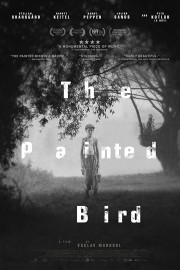The Painted Bird
I’m not sure that anyone could have done a better job than writer-director Václav Marhoul at adapting Jerzy Kosinski’s polarizing novel, The Painted Bird, for the screen. That doesn’t mean Marhoul has made a successful adaptation, but he’s definitely made a film that tries to illuminate the journey of a young Jewish boy across Europe, back to his parents, during WWII, and pulled no punches in terms of content. I’ll admit- this was a difficult sit, partially because of the film’s stoic 169-minute running time, but by the end, I felt like it was a challenge worth accepting.
Kosinski’s novel was controversial mainly because he passed it off for autobiography for a long time. He eventually backed off of those claims, but the controversy also extends to the story’s content, which includes rape, torture, pedophilia, animal cruelty, bestiality, and violent antisemitism among many of the peasants the boy (Petr Kotlár), whose name we only learn at the end, meets along the way. It’s one thing to write this content, and another to see it, and Marhoul spares us nothing in depicting it. This is an ugly, unrelenting movie, and some of the images will be enough to turn people off to the film long before it ends. We see some of the worst of humanity on the screen in this film, and it’s not easy to sit through for so long.
I’d be curious to read Kosinski’s novel to see if it was an easier read than Marhoul’s film is to watch. It is supposedly written from the perspective of the main character, which makes sense, and Marhoul tries to make this an experiential story in his cinematic adaptation. The problem is that the main character, Joska, is a passive one; there is very little he does in this film to drive the narrative- among the closest things he does is not put out a fire that starts at his aunt’s house, deliver an injured horse back to a village, and cause the death of an abusive caretaker he’s been housed with- and he does not really say much. That’s not a death sentence for a film- Bresson did something very similar with his powerfully empathetic “Au Hasar Balthazar,” which follows the life of a donkey- but when your character is capable of action, and giving us insight into their thoughts and feelings, and you do not give them a chance to express either, it makes a cinematic narrative difficult to engage with, especially when that narrative is as filled with cruelty as this one is.
There are actors in this film you will recognize- Udo Kier, Stellan Skarsgard, Harvey Keitel, Julian Sands and Barry Pepper most especially- but they come and go as Joska makes his way to his family. Some of them show the boy kindness, some of them cruelty, but all of them present an important emotional weight in their personalities at the moments we see them. This is a well-made movie by Marhoul, and it’s easy to see why he was able to get those people to join on, and their scenes are among the most memorable ones in the movie. He does a good job getting strong performances out of his actors, even if we don’t really feel anything from our main character.
A film that kept popping into my head during this one was Terrence Malick’s “A Hidden Life.” I’ve found many of the director’s prior films very passive, and hard to get into, because he seemed more enamored with what he was doing visually, and us experiencing that, than telling us a compelling narrative. His recent epic about the struggle of Franz Jagerstatter, in his refusal to fight for the Nazis because of their terrible morality, clicked with me because Malick’s visual and emotional storytelling instincts seemed more connected that I felt like they ever had been before; he managed to show a pure soul struggling against an injust world in a way that resonated with me. “The Painted Bird” reminds me of those earlier Malick films- more enamored with his visual storytelling, but not really giving us an emotional foothold narratively to latch on to. When he seems to stumble into one, it lands, but those moments are fleeting, and often, too late for us to remain interested in the film, and how it concludes.










